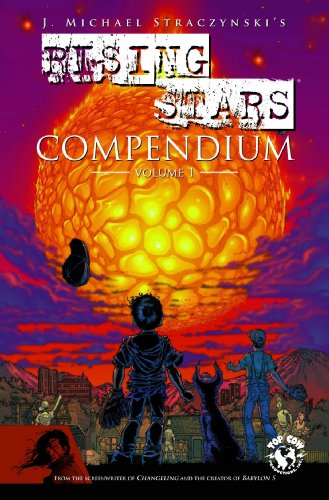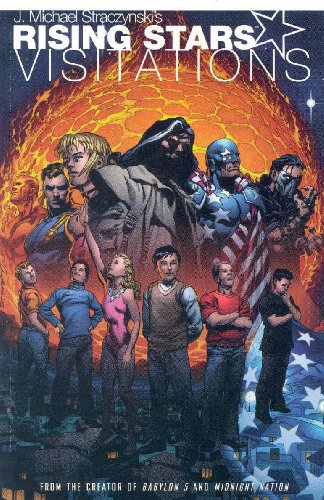
![]() Rising Stars: Compendium (Part One) by J. Michael Straczynski
Rising Stars: Compendium (Part One) by J. Michael Straczynski
Having just finished Straczynski‘s Rising Stars, I now have a new comic book to add to my list of favorites. JMS, as he’s known, is the creator of Babylon 5, and he applies his grand world-building skills to this superhero comic. As Neil Gaiman writes in the introduction to Rising Stars, with Babylon 5, JMS did what should have been “impossible,” but with Rising Stars he merely did what was “very unlikely.” JMS is also the author of The Book of Lost Souls and Silver Surfer: Requiem, as well as the new comics just launched by his company, Joe’s Comics: Ten Grand and Sidekick.
Rising Stars is about 113 people who were in utero when a fireball struck the small town of Pederson, Illinois. Though the effects weren’t noticed until the children began to manifest a variety of abilities, the medical team run by the government — of course! — eventually traced those effects to the flash from the fireball. Rising Stars follows the lives of many of those 113 kids. Obviously JMS can’t tell all of their stories, but he tells more than you’d believe without their stories being confusing or seeming rushed. Of course he focuses on a few key characters and their inner conflicts as well as their conflicts with one another.
 This story is a superhero story, and I really wish the superhero genre didn’t have such a limited meaning in our culture — I certainly didn’t understand how different one superhero story could be from another until I started reading comics a few years ago. So, even if you aren’t a fan of The Avengers, I think many of you would like this very human story: It’s told by The Poet, one of the 113 kids who come to be known as “Specials.” The fact that he tells the story allows for him to talk to us about what it would feel like for anybody to grow up with unwanted, greatly feared powers.
This story is a superhero story, and I really wish the superhero genre didn’t have such a limited meaning in our culture — I certainly didn’t understand how different one superhero story could be from another until I started reading comics a few years ago. So, even if you aren’t a fan of The Avengers, I think many of you would like this very human story: It’s told by The Poet, one of the 113 kids who come to be known as “Specials.” The fact that he tells the story allows for him to talk to us about what it would feel like for anybody to grow up with unwanted, greatly feared powers.
To give you a sense of JMS’s wonderful storytelling ability, The Poet, perhaps the most powerful of the Specials, really does write and publish poetry; however, only small journals will accept his poems—apparently he’s just not as good at writing poems as writing the memoir — Rising Stars — which we are reading! There’s an amusing scene with The Poet—feared on the streets—on the phone begging a literary agent to accept one of his poems, willing to make any changes necessary. Ultimately, The Poet is the key character, the Byronic hero, the misunderstood artist, the isolated lover, and his story will connect with the story of every other Special in unique ways. But, with all that thematic weight put on him as a character, he isn’t boring or one-dimensional: I like that JMS makes clear to us that as much as he’s a Byronic hero, he’s not Byron when it comes to actually writing poetry.
 Also at the center of this human story is Dr. Welles. He is hired by the military to watch over the kids and monitor their developments; however, he is more sympathetic to the kids than to the military and government interests who hire him to be both doctor and spy. He becomes the father-figure for the Specials, even into their adulthood. He is situated by JMS as the figure opposing David Paulson, the military leader who hates all the Specials. In other words, while the world divides over their love and hatred of the Specials, JMS has those feelings represented by the two opposing characters of Welles and Paulson.
Also at the center of this human story is Dr. Welles. He is hired by the military to watch over the kids and monitor their developments; however, he is more sympathetic to the kids than to the military and government interests who hire him to be both doctor and spy. He becomes the father-figure for the Specials, even into their adulthood. He is situated by JMS as the figure opposing David Paulson, the military leader who hates all the Specials. In other words, while the world divides over their love and hatred of the Specials, JMS has those feelings represented by the two opposing characters of Welles and Paulson.
In the end, every Special develops his and her own unique powers, and the reason for those differences are explained. Also, the source of the fireball is revealed. The ending is well thought-out. The final images will stay with me for a long time — both because of JMS’s story and because of the excellent artwork. I hesitate to say anymore because JMS is great at building suspense, and almost anything I say will give something away.
For me, this story is a five-star epic. In 28 issues, JMS tells a complete story that is enormous in scope; however, it’s possible to read all 620 pages in one or two days. Many Marvel and DC stories about well-known superheroes are developed by multiple writers over decades, but in only 28 issues, JMS manages to tell an incredible number of origin stories as well as individual story lines for different superheroes and villains. He even makes sure that Rising Stars is unified thematically on multiple levels. I have a sense of completeness when it’s over*. I can’t recommend this work highly enough. Did I mention WHY this comic is a five-star comic? It’s simple: Kat won’t let me rate any books higher here at Fanlit.
 *There are available an additional 340 pages, or 14 issues, of Rising Stars that develop individual characters, but it’s not necessary to read them — they are included in the 1000-page paper edition. ComiXology splits the volume in two. Note that these extra stories are written by Fiona Avery and not by JMS. Should you want to track down the smaller trade editions, you might want to know that the stories written by JMS and Avery are divided in the following manner: JMS wrote Rising Stars: Born in Fire (issues #1-8), Rising Stars: Power (#9-16), Rising Stars: Fire and Ash (#17-24), and Rising Stars: Visitations (#0, #1/2, “Prelude, and “A Lost Tale of the Specials”). Fiona Avery wrote Rising Stars: Bright (#1-3), Rising Stars: Voices of the Dead (#1-6), and Rising Stars: Untouchable (#1-5, and includes JMS’s 4 issues collected in Visitations). In Rising Stars: Compendium Part One on Comixology, JMS’s Visitations is actually presented before issues 1-24. I didn’t realize until I finished reading the story. I’m glad I read those first. If you purchase the trade edition, I recommend reading at least #0, #1/2, “Prelude,” and “A Lost Tale of the Specials” first. Reading in that order really works well. Reading them after #24 would seem anti-climatic. Rising Stars: Compendium PART Two on ComiXology is the second half of the truly complete trade edition Rising Stars: Compendium.
*There are available an additional 340 pages, or 14 issues, of Rising Stars that develop individual characters, but it’s not necessary to read them — they are included in the 1000-page paper edition. ComiXology splits the volume in two. Note that these extra stories are written by Fiona Avery and not by JMS. Should you want to track down the smaller trade editions, you might want to know that the stories written by JMS and Avery are divided in the following manner: JMS wrote Rising Stars: Born in Fire (issues #1-8), Rising Stars: Power (#9-16), Rising Stars: Fire and Ash (#17-24), and Rising Stars: Visitations (#0, #1/2, “Prelude, and “A Lost Tale of the Specials”). Fiona Avery wrote Rising Stars: Bright (#1-3), Rising Stars: Voices of the Dead (#1-6), and Rising Stars: Untouchable (#1-5, and includes JMS’s 4 issues collected in Visitations). In Rising Stars: Compendium Part One on Comixology, JMS’s Visitations is actually presented before issues 1-24. I didn’t realize until I finished reading the story. I’m glad I read those first. If you purchase the trade edition, I recommend reading at least #0, #1/2, “Prelude,” and “A Lost Tale of the Specials” first. Reading in that order really works well. Reading them after #24 would seem anti-climatic. Rising Stars: Compendium PART Two on ComiXology is the second half of the truly complete trade edition Rising Stars: Compendium.



Great review Brad. I think of a couple issues in the comic book boxes some where. I’LL have to dig it out.
Just a heads up fantasy and comic book fans.; over on Comixology.com Thee Dresden Files graphic novels in digital format our on sale through the 15th. $0.99 for individual issues or $11.99 for the whole bundle.